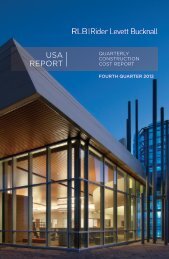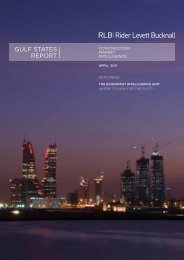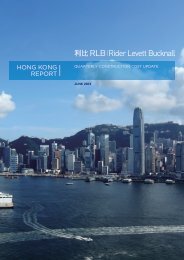International Construction Cost Commentary - Rider Levett Bucknall
International Construction Cost Commentary - Rider Levett Bucknall
International Construction Cost Commentary - Rider Levett Bucknall
Create successful ePaper yourself
Turn your PDF publications into a flip-book with our unique Google optimized e-Paper software.
Canberra<br />
The volume of projects now entering<br />
the marketplace has reduced to a more<br />
sustainable level with the result that more<br />
competitive tendering conditions are now<br />
being felt. With the smaller selection of<br />
projects available, local contractors and<br />
sub-contractors alike are reducing their<br />
overheads and margins in an attempt<br />
to secure future workload, especially<br />
since many Sydney-based companies are<br />
venturing further afield into the Canberra<br />
market. Despite continuing upward<br />
pressure on material and labour costs,<br />
overall prices increases are modest and<br />
have been somewhat camouflaged by the<br />
tighter tendering conditions and eroding<br />
margins.<br />
Contractor sentiment towards the state<br />
of the market is apprehensive and there<br />
are signs of reduced confidence in the<br />
residential and commercial sectors.<br />
However, the public sector continues<br />
to provide a consistent stream of work,<br />
somewhat offsetting the slowdown in<br />
commercial sectors.<br />
The immediate outlook is for extremely<br />
competitive market conditions, offering<br />
potential clients an excellent tendering<br />
environment in the first half of 2009.<br />
Darwin<br />
The recent announcement that<br />
international giant Inpex will be investing<br />
$12bn in a new gas plant in Darwin in two<br />
years time is keeping optimism high and<br />
the economy buoyant in the NT. Front<br />
end engineering and design for the plant<br />
will be starting soon and a Govt. task force<br />
has been formed to ensure adequate social<br />
and economic infrastructure is put in place<br />
in time for the influx of workers and their<br />
families to Darwin over the coming years.<br />
This coupled with intervention works in<br />
remote communities, continuing works on<br />
the Darwin City Waterfront Project, and<br />
continuing and upcoming Defence projects<br />
at all major NT Defence bases will see<br />
tender prices continue their upward trend.<br />
Notwithstanding the current global credit<br />
crunch, with this scale of development<br />
earmarked for Darwin, we expect the<br />
construction industry to remain strong<br />
over the coming period.<br />
Melbourne<br />
Several major commercial projects are<br />
currently running through to completion<br />
in the next six months, amidst an already<br />
tightening overall construction market.<br />
Tendering opportunities have become<br />
scarce as developers have shied away from<br />
marginal projects, due to inability to obtain<br />
finance and lack of tenant certainty. All this<br />
has given rise to cuts in contractor and subcontractor<br />
margins, set alongside increasing<br />
building materials and wages costs and<br />
further fuelled by falling exchange rates,<br />
rising utilities costs and industry awards.<br />
There remains pent-up demand for<br />
residential projects and developers are<br />
exploring options, however these are<br />
dependant upon the return of confidence<br />
in the market and ability to obtain funding.<br />
Industry clients with high liquidity of funding<br />
will find excellent competitive tendering<br />
conditions in the first half of 2009. The<br />
public sector will be particularly well-placed<br />
to obtain good pricing for projects.<br />
Perth<br />
The Western Australian economy is<br />
probably better placed than most States in<br />
Australia to weather the current economic<br />
storms. However, the extent to which<br />
China slows or slips into recession has<br />
potential to initiate a further deterioration.<br />
Most construction sectors have been<br />
similarly affected by the slowdown and<br />
forecasts are for very much reduced<br />
consumer demand in the coming period.<br />
One result has been that, although rents<br />
are at an all time high, uncertainties in the<br />
general economy and a more cautious<br />
new State Government have led to the<br />
cancellation of a number of major projects.<br />
Whilst materials costs are anticipated to<br />
continue rising, labour costs have levelled<br />
and may even be falling in some specific<br />
trades.<br />
Overall, this is the first relief from a<br />
prolonged period of price increases.<br />
Tenders are beginning to show signs of<br />
increased competitiveness returning to the<br />
market.<br />
Sydney<br />
In addition to the global and national<br />
economic problems, there is ongoing<br />
uncertainty in the Sydney market for<br />
both the short and medium term, due to<br />
a State mini budget that raised property<br />
and land taxes and reduced infrastructure<br />
expenditure as well as the Federal proposal<br />
for increased expenditure on undefined<br />
capital works projects. Contractors are<br />
very aware that the number of future<br />
projects is diminishing. Current projects<br />
are nearing completion and it is becoming<br />
increasingly difficult to replace work in<br />
hand, so Contractors and sub contractors<br />
alike are now keen to look at all tender<br />
opportunities. As a consequence, labour<br />
cost increases are being absorbed within<br />
profit margins and materials price rises<br />
are being discounted as contractors<br />
and suppliers look to secure works<br />
commencing in the new year.<br />
Reduced tendered margins are being<br />
experienced and we expect this trend to<br />
continue throughout 2009.<br />
Auckland<br />
Despite interest rate cuts since July, the<br />
Auckland residential market remains flat.<br />
Meanwhile, the other building market<br />
sectors have now become similarly<br />
affected, with demand and access to<br />
development finance rapidly declining.<br />
Only the infrastructure sector has been<br />
unaffected by the downturn, with central<br />
Government funded projects continuing<br />
through the maelstrom. Local government<br />
spending conversely is set to be slashed.<br />
Despite weak demand, building materials<br />
costs for contractors are rising, due<br />
to general cost increases coupled with<br />
the falling New Zealand dollar, which<br />
is offsetting recent falls in international<br />
commodity prices. Highly competitive<br />
market conditions however are set to<br />
remain, with contractors targeting margins<br />
and overheads to secure a limited supply<br />
of work.<br />
The constraint on this process will be the<br />
point at which deeper cuts into profit levels<br />
become unsustainable.<br />
Christchurch<br />
General economic conditions in<br />
Christchurch mirror those in Auckland,<br />
although Christchurch has several<br />
major projects currently either under<br />
construction, recently commenced (AMI<br />
Stadium and New Christchurch Civic<br />
Building) or due to commence shortly<br />
(Christchurch Airport Redevelopment).<br />
Together, they have a combined value<br />
in excess of $300 million, which will be<br />
keeping the industry relatively busy well<br />
into and possibly through 2009. However,<br />
we are noting in recent tenders, greatly<br />
increased competition and associated price<br />
cutting in terms of margins.<br />
These conditions are likely to persist in<br />
the next period as tendering opportunities<br />
continue to be adversely affected by the<br />
lack of confidence in the market and<br />
problems of financing. This is already<br />
apparent in the small to mid-size project<br />
end of the market.<br />
Wellington<br />
Wellington is also feeling the effects of<br />
the credit crunch, but is coming off a 20<br />
year high in construction volume. The<br />
excess of labour supply thus created is<br />
giving rise to competition and price cutting<br />
in the context of fewer new tendering<br />
opportunities. However, Wellington has<br />
at least six major projects commenced<br />
or about to commence, with a total<br />
value of approx $200m. Further, two<br />
major Wellington City Council (WCC)<br />
projects are currently seeking consultant<br />
submissions, with confirmation that they<br />
will proceed, and there is also the new<br />
sports stadium and extensions to the City<br />
Art Gallery.<br />
These projects plus others in mid<br />
construction will keep the workforce busy<br />
through 2009 and into 2010.<br />
17<br />
INTERNATIONAL CONSTRUCTION COST COMMENTARY: January 2009

















